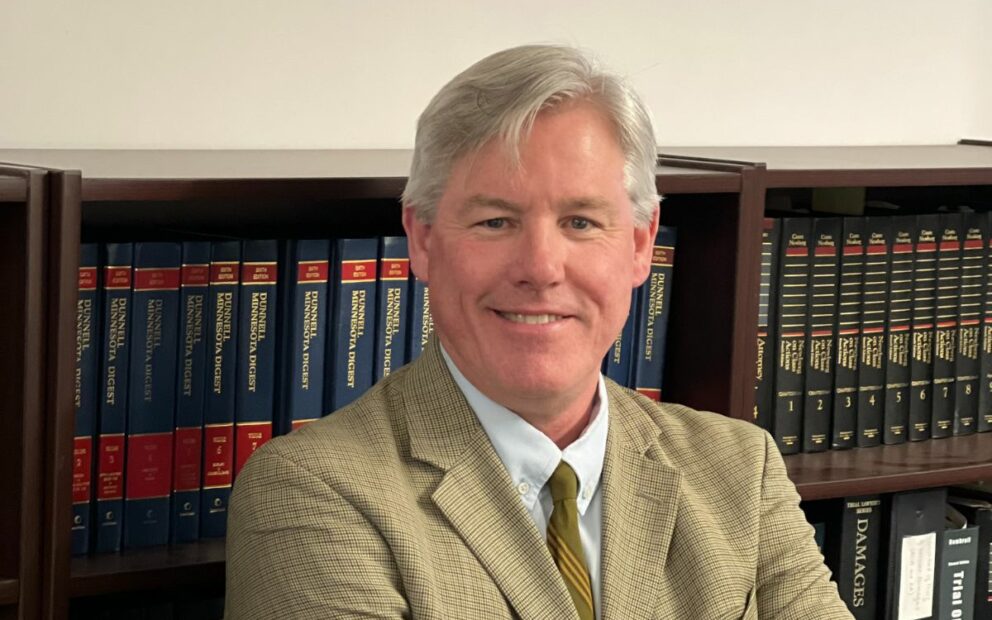Breaking the Ice: MMLA chief builds on tradition – MinnLawyer

by Todd Nelson
Milo Mumgaard couldn’t resist the opportunity to be Mid-Minnesota Legal Aid’s new executive director.
Mumgaard joined Mid-Minnesota Legal Aid, the state’s largest nonprofit law firm, in late February. His experience includes serving as executive director of legal aid organizations in his native Nebraska and Arkansas.
“The most important thing is building on the traditions and the culture that Mid-Minnesota has created, the lengthy list of successes, the high expectations,” Mumgaard said.
Throughout his career in legal aid and public law, Mumgaard said, he has used Mid-Minnesota Legal Aid as a model for providing equal justice.
“Using the law to solve problems and to advance the interests of people who otherwise wouldn’t get the legal help to put the power of law on their side truly is a catalyst to change and a catalyst to good things,” Mumgaard said.
Title: Executive director, Mid-Minnesota Legal Aid
Education: B.A., political science, University of Nebraska-Lincoln; J.D., New York University School of Law
Q: Best way to start a conversation with you?
A: I’m very open and accessible, so just call me up. Call me up, email me. In fact, I’ll be calling and emailing people right and left. I’m very extroverted.
Q: Why law school?
A: When I was in college, I never thought of being an attorney. But I definitely early on decided I wanted to do something that sought to improve the lives of people who are struggling and low-income people. My values were driving me in that direction. I realized that I could do this through the law. I think anybody that goes to law school recognizes that law is a powerful tool for change. And it depends on how you want to apply that and use it.
Q: What are you reading?
A: “The Rediscovery of America: Native Peoples and the Unmaking of U.S. History.” I’m fascinated by the perspectives of and histories of Native peoples. Part of my background is in Indian law. It’s a fascinating book. I encourage people to look at it.
Q: Pet peeve?
A: The notion that we can’t get things done, that there is no hope, that there is no future. I’m a very optimistic person.
Q: Best part of your work?
A: The community of people and the support networks and the feeling that you’re part of a greater whole and venture. That’s not just the people that I work with. It’s also the volunteers, the people in the profession, community people and so on.
Q: Most challenging?
A: A lot of people would say that we don’t have as many resources or we don’t pay our people as well. I think actually the most challenging is overcoming the idea that we are in our work, not as competent or as skilled, when in fact, I would say most of the time we’re more skilled, and more competent. We’re the only ones in our areas oftentimes. The challenge is to remind and reassure ourselves as well as the broader legal profession, that we’re in it to win it.
Q: Favorite activity away from work?
A: That’s one reason I moved to Minnesota. My wife and I have a boat, so we finally get to put our boat into Minnesota lakes.
Q: Where would you take someone visiting your hometown?
A: Lincoln, Nebraska, and I’d take them to the Zoo Bar. It’s the best blues bar in the Midwest.
Q: Legal figure you admire?
A: Peter Edelman. Peter is a native Minnesotan and is presently at Georgetown Law. Within poverty law, he’s a living legend.
Q: Misconception about your work?
A: That we’re more of a social service organization. We’re very much a justice organization. That’s who we are. We’re all about making equal justice happen.
Q: Favorite book, movie or TV show about lawyers?
A: My favorite of all time is “The Verdict” with Paul Newman. I recommend that any attorney watch the closing argument, which he when he focuses on, why do we do this work for justice?

